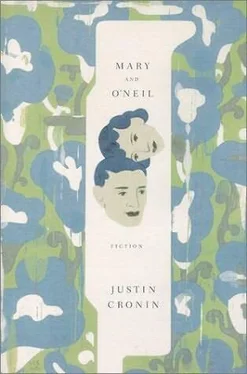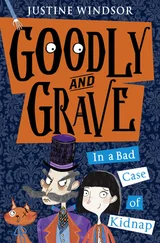She looked at Mia. “Did Jack go back to the casino?”
“The professor said to tell you to meet him there,” she replied.
“I see.” What else was there to say? But she found herself glad; she had time yet. Let him gamble. “Perhaps later,” Kay said.
They strolled the length of the beach, Noah dawdling to pick up shells left bare by the tide. Behind them the ambient sounds of the resort grew faint. They made their way to the end, where the sand stopped and a chain-link fence topped with razor ribbon sealed the edge of the property. She had seen it before, in daylight, and thought nothing of it; now, in the darkness, it gleamed forbiddingly. Beyond it stood a run-down house, the stucco peeling away. A skinny dog was chained in the front yard, chewing at something in the dirt. On the porch steps a light suddenly blazed: a match, and then, from the shadows, the scent of marijuana. She heard a man’s deep laugh, and then a pair of voices talking, words she could not understand. Without warning fear sliced through her. How sturdy was the fence? Had they been seen?
She stepped back, calling to her children in a harsh whisper. “Come away from there, boys.”
Sam held fast to the fence, plainly interested. Here was something new. “I want to see-”
“Now.”
They retraced their steps back toward the resort, a blazing oasis of light and music, and by the time they had returned to the condo, her nervousness was gone. The air had taken on a floral sweetness; above them the palm fronds rustled, a sound like girls in taffeta skirts descending a flight of stairs. The steel band had resumed playing on the patio. For the adults the night was just beginning, but for the children it was over; the boys were completely drained by the day, even Sam, who snuck a thumb into his mouth as he stood before the toilet to pee. She tucked them in and told them no nonsense, and joined Mia on the porch.
She was wearing a sweater around her shoulders, and held her purse. “I was wondering,” Mia began, “if you don’t want to play cards tonight-”
“Go, go,” Kay said. “Take the rest of the evening off.”
She hesitated, but her face was delighted. “Thomas says there is a party, for the staff. I can be back in time to watch the boys if you change your mind.”
Kay waved her away. “You’ve done enough,” she said.
She sat in a rocker on the porch and waited for Jack. She supposed that his not returning was a good sign; it meant he was still winning. A gauze of stars hung low above the bay, and a gentle wind blew. At eleven she went inside and dressed for bed, but sleep would not come; sometime later she felt the pressure of the air in the room change and heard the door open. She rose and went to the hall. Mia was putting her purse on the table.
“Oh!” she said, startled. She put a hand over her heart. “You frightened me.”
“I’m sorry. I thought it might be Jack.”
“It is very late. I didn’t mean to wake you.”
“I wasn’t sleeping.” She paused a moment and regarded Mia, the girl before her. She didn’t quite know what she was looking for. Mia was barefoot, and her feet were sandy; more sand was on her throat, in her hair, the pure white sand one found just above the high-tide line, as fine as powder.
“Kay?”
“It’s nothing. It’s all right.” She tried to smile. “Did you have a good time?”
“It was just a party.” She shrugged. “American boys can be so… what is the word? They want things.”
“Needy.”
“Yes, they need us. Even the little ones!” Mia laughed. “You can see it in Sam. He’s going to be quite the lady’s man, I think.”
“Like his father.”
Mia said nothing; her face showed nothing.
“When we get back, I’m going to release you,” Kay said. “You can stay a month, and we’ll pay for the ticket home.”
Again, Mia’s face showed no emotion. She looked at the ceiling, then back at Kay. “I don’t know what to say. Perhaps that is for the best.”
“It’s going to be hard for the boys. You’ll have to help me make it easier for them. They’re my first concern. I’m not going to tell them until we get back to Vermont.”
Mia nodded. “Of course.”
“I don’t see the situation as in any way your fault, Mia. You’ve been a great help to me, and to this family. I want you to know that.”
Mia nodded and crossed her arms. Her eyes swelled with tears, though her face was firm. She swallowed once, then exhaled sharply through her nose. “But still, I am fired.”
“Yes. I’m sorry to say it, but yes.”
After Mia had gone to her room, Kay dressed in a skirt and blouse and sandals, brushed her hair, and looked in on the boys once more. They were asleep in a jumble, the sheets of the double bed they shared twisted around them in the heat. She watched them breathe and sleep, as she had done for hundreds of hours since each had been born, then wrote them a note to tell them where she was, and left it on the table where they could see it.
She was two months pregnant. She had figured it out that morning, or begun to, when she had awakened on the beach and heard the band playing on the ship. She had skipped her period again, but she hadn’t taken this absence seriously, not until she’d heard the music. She knew there was no such band; the sound was coming from inside her. Crazy, but that was how she’d known with Sam and Noah. She tried to imagine this new baby, hoping for a girl, but all she could see was a tiny face pressed to her remaining breast, a child who would never know there had ever been two.
Carrying her shoes, she walked across the sand to the casino. She found Jack at the table, and knew at once that he had lost it, lost it all. The eighteen thousand was gone, and more; he was down three grand. It was poker that had done it. Bored with blackjack, he had decided to sit in a few hands, and lost it all fast. For two hours he had tried to recoup his losses at the blackjack table, and watched more dribble away. He’d hardly slept the night since they’d arrived, three days ago. His eyes were wild and desperate.
“Help me,” he said.
“Goddamn it, Jack.” She took him to a quiet corner. “How much cash do we have left?”
“Three thousand.” He put his face in his hands and began to weep. “Kay, I’m sorry, I’m sorry.”
She computed rapidly. Three days left; they could get by on a thousand if they had to, two to play it safe. The rooms were paid for. How much had they charged for meals, the boat, the trip to the fort to give a whale to Noah? She took his wallet from him, heavy and warm from his pocket.
“We’ll talk later,” she commanded. “Go back and sleep now.”
The casino was quiet; only a few tables were running. She cashed five hundred dollars in travelers checks and took her place at one, stacking her chips on the green felt before her. A waitress approached her and she asked for a glass of water, no ice. It was 2:00 A.M.; she had a van to catch at nine. Seven hours to win back three thousand dollars. She rolled up her sleeves.
“Ma’am?”
She met the dealer’s eye. Others were waiting for her bet before the cards could be dealt. In a moment the game would begin again, but still she paused. In the condo her babies were sleeping; all around she felt the blueness of the sea. It was all real, it was this world and no other, and she was in it. She pulled a fifty-dollar chip from the pile.
“Deal,” she said.
January 1995
MARY AND O’NEIL: they were like any couple. She, just thirty, her figure slender, her beauty pale and Nordic, not striking but sensible; he, two years older, with large, soft hands and a web of creases just taking hold at the corners of his eyes. Homeowners, voters, employees; the provisional adulthood of their twenties was over. They were both teachers, work they told themselves was honorable, though it was, in reality, a career each had chosen by accident, a temporary arrangement made permanent when bolder plans drifted away. Their house, in an older suburb outside Philadelphia, was trying to bankrupt them; the wiring was bad, a spring rainstorm sent them scurrying with kitchen pots, there was lead paint everywhere, chiseled with cracks fat enough to wedge a dime into. Its history was obscure. Prying away a piece of rotten window trim, O’Neil had discovered a Christmas card, dated 1879, with these words, written in schoolmarmish hand so precisely shaped that O’Neil first thought they were typed: “You mention the knife which arouses my curiosity as to whether you received the calendar. I should be much obliged to you to advise me in this regard. I received for Xmas anything and everything from stiff-backed handkerchief to coil-spring ear laps.” They passed their weekends in dust masks and tool belts and old clothes spattered with paint-blue for the bedroom, linen for the living room and hall, a buttery yellow for the guest room that seemed cheerful in the store but turned out to be a bad mistake, the color of electrified lemons-and on Monday mornings emerged from the front doorway to begin another week of teaching, crescents of paint under their battered fingernails, their shoulders bent below the weight of textbooks so fattened with underlines they seemed to have been left out in the rain. In the evening, half watching a television program or listening to music, they graded tests and essays on the sofa, breaking the silence of their earnest work only to ask small questions of each other, or solicit an opinion: Would you like tea? Could I borrow your Hi-Liter? Now, does this sentence make any sense at all? Sometimes, beneath a blanket they had brought from upstairs, their still faces grazed by the glow of the television, they fell asleep right there, slipping into an unconsciousness that was somehow deeper for having occurred by accident, and awakened hours later to the flow of images on the television screen-a gangster loading a pistol, a woman in a leotard pumping a ski machine, a flight of birds above a grassy field-that they had swept into their dreams.
Читать дальше












